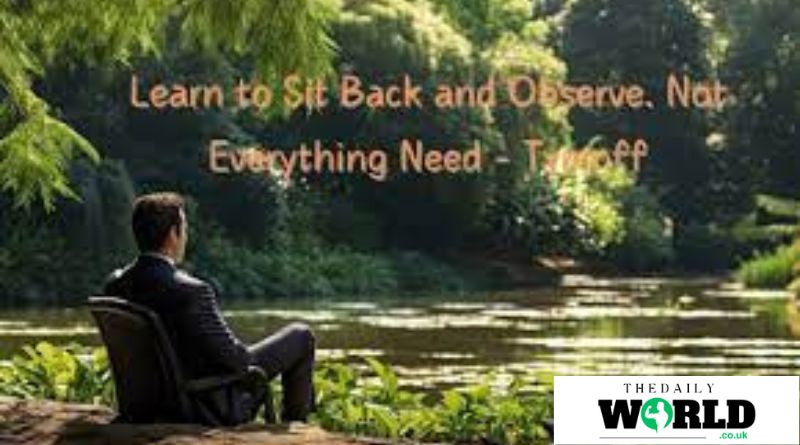Learn To Sit Back And Observe. Not Everything Need – Tymoff: Not Everything Needs Your Attention.
In today’s fast-paced world, where instant gratification and constant stimulation have become the norms, it can be incredibly challenging to take a step back and simply observe. The wisdom behind the phrase “learn to sit back and observe. not everything need – Tymoff” resonates deeply in our hyper connected society. This saying encourages us to cultivate patience, mindfulness, and discernment in our daily lives. Let’s delve into why adopting this philosophy can lead to a more balanced, fulfilling, and insightful existence.
The Art of Patience and Observation
Patience is often heralded as a virtue, yet it is one of the most difficult qualities to cultivate. In an era where technology provides immediate responses and solutions, waiting feels like an unnecessary inconvenience. However, patience is a crucial component of personal growth and success. Learning to sit back and observe involves practicing patience, which allows us to see situations from a broader perspective and avoid hasty decisions.
When we observe rather than react impulsively, we gain a deeper understanding of our surroundings and the people within them. Observation fosters a sense of awareness that can reveal underlying patterns and motives. This understanding can inform our responses, making them more measured and appropriate. By stepping back and observing, we can approach situations with greater clarity and insight, leading to more effective problem-solving and decision-making.
The Importance of Mindfulness
Mindfulness is the practice of being fully present in the moment, aware of where we are and what we are doing, without becoming overly reactive or overwhelmed by what is happening around us. It is a powerful tool that can enhance our ability to sit back and observe.
Incorporating mindfulness into our daily routine can help us become more attuned to our thoughts and emotions. This heightened awareness can prevent us from being swept away by the tide of our immediate reactions. Instead, we can observe our thoughts and feelings, acknowledge them, and choose how to respond. This mindful approach can lead to more thoughtful and deliberate actions, rather than knee-jerk reactions that we might later regret.
Discernment: Knowing When to Act
Not every situation requires our immediate intervention or attention. One of the key lessons from “learn to sit back and observe. not everything need – Tymoff” is the importance of discernment. Discernment is the ability to judge well, to distinguish between what is essential and what is not, and to know when to engage and when to let things unfold on their own.
Practicing discernment involves recognizing that not all problems are ours to solve. Sometimes, stepping back allows others to take responsibility for their actions and learn from their experiences. This can be particularly challenging for those who feel a strong compulsion to help or fix things for others. However, learning to trust in the process and allowing others the space to navigate their challenges can lead to more sustainable outcomes and personal growth for everyone involved.
The Benefits of Letting Go
Holding on to the need to control every aspect of our lives can be exhausting and counterproductive. By embracing the philosophy of sitting back and observing, we can experience the liberating benefits of letting go. Letting go does not mean giving up or becoming passive; rather, it involves releasing the need to micromanage and trusting that things will unfold as they should.
Letting go can reduce stress and anxiety, as it shifts our focus from what we cannot control to what we can. It allows us to conserve our energy for situations where our input is genuinely needed and can make a positive difference. Additionally, letting go can foster a sense of peace and acceptance, enabling us to appreciate the present moment and the beauty of life’s natural ebb and flow.
Practical Tips for Embracing the Philosophy
Adopting the “learn to sit back and observe. not everything need – Tymoff” philosophy requires conscious effort and practice. Here are some practical tips to help you incorporate this mindset into your daily life:
- Pause Before Reacting: When faced with a challenging situation, take a moment to pause and breathe before responding. This brief pause can help you gain perspective and approach the situation with a calmer, more thoughtful mindset.
- Practice Mindfulness: Engage in mindfulness practices such as meditation, deep breathing exercises, or simply taking a few moments each day to be present and aware of your surroundings. Mindfulness can enhance your ability to observe without immediate judgment or reaction.
- Reflect on Your Motivations: Before jumping into action, ask yourself why you feel compelled to intervene. Is it truly necessary, or can the situation resolve itself without your input? Reflecting on your motivations can help you discern when to act and when to step back.
- Set Boundaries: Establish clear boundaries to protect your time and energy. Learn to say no when necessary and prioritize your well-being. Setting boundaries can help you avoid becoming overwhelmed by external demands.
- Trust the Process: Cultivate a sense of trust in the natural progression of events. Recognize that not everything requires your immediate involvement and that some situations will resolve themselves in due course.
Conclusion: A More Balanced Approach to Life
The wisdom encapsulated in “learn to sit back and observe. not everything need – Tymoff” offers a valuable lesson for navigating the complexities of modern life. By cultivating patience, mindfulness, and discernment, we can approach situations with greater clarity and composure. Letting go of the need to control everything allows us to focus our energy on what truly matters, leading to a more balanced, peaceful, and fulfilling life.
Embracing this philosophy does not mean disengaging from the world around us; rather, it involves choosing our engagements wisely and recognizing that sometimes the most profound insights and solutions emerge when we take a step back and simply observe
Read also: check













